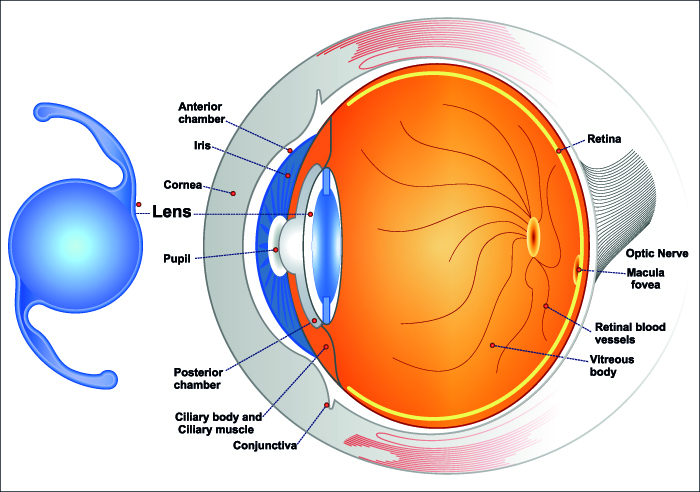IOL Surgery Treatment & Diagnostics in Chembur, Mumbai
IOL Surgery
The eye consists of a lens which helps in focusing the light rays from an object onto the retina to produce an image. Cataract is a condition of the eye involving the crystalline lens. It most commonly occurs due to old age or senescence. There are changes in lens protein which lead to formation of cataract. It presents as varying degrees of clouding of vision due to many different causes and diseases. Cataracts may also lead to complete loss of vision or blindness. In such cases, the natural lens of the eye will have to be replaced by an artificial lens. Thus, it is important to visit an ophthalmology doctor near you with any complaints of blurred vision at the earliest.

What is an IOL?
IOL is the acronym for IntraOcular Lens, which is inserted into the eye by surgical means. The powers of IOLs differ, and can focus the light, similar to eyeglasses or contact lenses. The difference is that the former is placed inside the eye surgically while the latter are external as the natural lens remains intact.
IOLs are made of materials such as acrylic, silicone and other plastic components. Based on the material, they are classified into:
- Rigid IOLs: Made from PMMA (PolyMethylMethAcrylate)
- Foldable IOLs: They are implanted using IOL injectors. Made from acrylic, silicone, hydrogel and collamer.
- Rollable IOLs: Ultra-thin, made from hydrogel.
The types of IOLs based on their focusing abilities are:
- Monofocal IOLs: They are the most common type in which the implant remains focused at a fixed distance, unlike the natural lens which bends and stretches to focus light rays on the retina. Hence, these IOLs may be clubbed with prescription glasses.
- Multifocal IOLs: In this type, the lens can focus at different distances, but it is common to have halos and glares with such types of IOLs as the brain gets adjusted.
- Accommodating IOLs: These are similar to the natural lens and can contort according to requirement but are expensive.
- oric IOLs: The lens has an additional effect of decreasing astigmatism, i.e. unequal focus due to eyeball shape.
What is IOL surgery in cataract?
IOL surgery is the method of choice to correct a cataractous lens. After completion of lens extraction using various methods like SICS, phaco-emulsification, etc, the eye is made ready for IOL implantation:
- Pupil is constricted
- Anterior chamber of the eye is filled with Healon.
- IOL is held with a forceps or injector and gently slid into the lens capsule.
Your ophthalmologist is the doctor who specializes in cataract surgery.
What are the indications for IOL surgery?
- Visual improvement: It is the most important indication for IOL implantation as visual handicap is a grave disability.
- Medical conditions: In conditions such as lens-induced glaucoma, retinal diseases, etc.
- Cosmetic: There are instances where there is no improvement of vision but the patient insists on surgery in order to obtain a black pupil.
When do you need to see a doctor?
If you have cataract issues, consult an eye doctor at the earliest.
You can request an appointment at Apollo Spectra Hospitals, Chembur, Mumbai.
Call 1860 500 2244 to book an appointment.
What is the procedure of IOL surgery and what to expect?
Before surgery: Your surgeon will measure the length of your eye and the curve of your cornea to determine the power and size of the IOL implant most suitable for you. This process is known as Biometry. You may also be asked to use certain eye drops to prevent infection and decrease eye swelling. You will have to be fasting for 6 hours before surgery to avoid anesthetic complications. You will be advised to take a scrub bath and get rid of facial hair.
During surgery:
- You may be given medicine to calm your nerves during the surgery.
- The eye to be operated will be marked.
- Antiseptic will be used.
- The pupil will be dilated with the help of mydriatic medication.
- Your eye will be numbed with either eye drops or a local anesthetic injection.
- Your surgeon will use a special microscope to perform the surgery by making small incisions or cuts near the corneal edge.
- Your surgeon will use microscopic instruments to remove the cataract and manipulate the IOL into the lens area.
- The incisions are self-sealing and an eye patch or shield is placed over the eye to protect it post surgery.
After surgery:
- It is important to follow your ophthalmologist’s instructions after surgery.
- You will be given pain medication for relief.
- You may be prescribed antibiotic eye drops and asked to wear an eye shield to prevent postoperative complications.
- Do not exert pressure on your eye as this can have serious repercussions. Thus, wearing an eye shield is mandatory.
What are the different methods of IOL implantation?
The type of implantation depends upon the type of cataract and the type of surgery done to extract the cataract.
- Anterior chamber IOL implantation
- Posterior chamber IOL implantation
What are the complications associated with IOL surgery?
Any surgical procedure has a risk of complications but this should not deter a patient from undergoing the surgery. Complications may include:
Pre-operative:
- Anxiety
- Nausea and gastritis
- Local anesthetic complications – haemorrhage behind the eyeball, decreased pulse rate, lens dislocation spontaneously, etc.
Intra-operative:
- Excessive bleeding in the eye
- Corneal injury
Postoperative:
- Eye infections
- Blurred vision, seeing halos and glares, visual disturbances, etc.
- IOL may be dislocated
Conclusion:
Cataract is a serious handicap for which you should visit an ophthalmologist near you as soon as you experience any symptoms, such as blurred vision, glare, etc. Cataract surgery and IOL implantation is an advanced eye surgery and is essential to prevent loss of vision. Your doctor will guide you and help you decide on the finances and the process to be followed at every step during your treatment.
No, IOLs may also be used for congenital aphakia, i.e. absence of the natural crystalline lens in children.
Yes, IOL implantation might be part of a day-care program if your ophthalmologist decides that you are fit to go home.
No, spectacles may provide temporary relief from glares and visual disturbances in cataract patients, but the lens will remain diseased and has to be replaced with an IOL.
Our Doctors
DR. NEETA SHARMA
MBBS, DO (Ophthal), ...
| Experience | : | 31 Yeras Experience |
|---|---|---|
| Speciality | : | Ophthalmology... | Location | : | Chembur |
| Timings | : | Thur, Fri : 10:00 AM... |
DR. PALLAVI BIPTE
MBBS, MS (Ophthalmol...
| Experience | : | 21 Yeras Experience |
|---|---|---|
| Speciality | : | Ophthalmology... | Location | : | Chembur |
| Timings | : | Mon - Wed, Fri & Sat... |
DR. NUSRAT BUKHARI
MBBS, DOMS, Fellowsh...
| Experience | : | 12 Yeras Experience |
|---|---|---|
| Speciality | : | Ophthalmology... | Location | : | Tardeo |
| Timings | : | Mon - Fri : 9:00 AM ... |
Treatments
Our Top Specialities
NOTICE BOARD
CONTACT US
CONTACT US
 Book Appointment
Book Appointment





.svg)
.svg)
.svg)
.svg)








